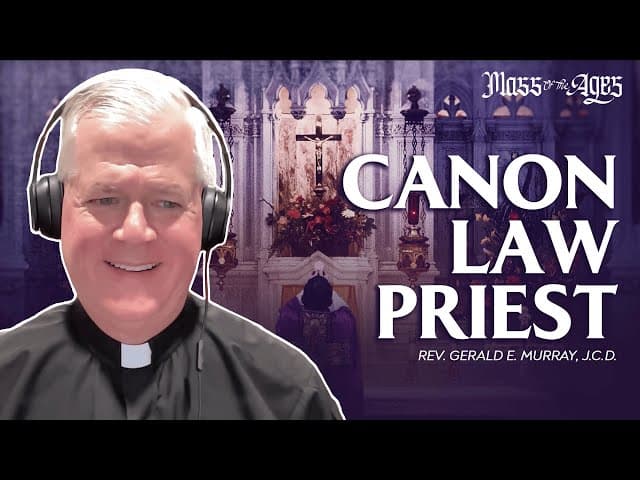Canon lawyer Fr. Gerald Murray talks with Cameron O'Hearn to answer one of the most debated questions in the Church today — can priests celebrate the Traditional Latin Mass after Traditionis Custodes? ⛪🎥 In this interview, we dive deep into Church law, priestly training, and the future of the Latin Mass. (Interview recorded while Pope Francis was the pope.)
Summarized responses from Fr. Murray:
- Can any priest learn the Traditional Latin Mass (TLM)?
Yes. There is no canonical prohibition against a priest learning the Traditional Latin Mass. It’s part of priestly education and preparation to celebrate it reverently and correctly.
- Can a priest celebrate a private Traditional Latin Mass on his day off or in his home?
It depends on when he was ordained.
Ordained before Traditionis Custodes (July 16, 2021): Yes, he can celebrate it privately without needing his bishop’s permission.
Ordained after Traditionis Custodes: No, he needs his bishop’s permission, and the bishop must first receive permission from Rome.
- What’s the difference between a public and private Mass?
A public Mass is open or advertised to the public (e.g., scheduled in a parish church).
A private Mass is not publicly announced or open to the public, though family or friends may be invited. It typically happens in a home or chapel setting.
- Can anyone attend a private Mass?
Yes. It can include invited guests, such as family or friends, but not the general public. It simply must not be advertised or publicly accessible.
- Can the laity arrange or attend a private Mass?
Yes. The faithful can invite a priest to celebrate a private Mass and may attend by invitation. However, it must remain genuinely private — not a de facto public Mass through widespread publicity.
- Can a local bishop ban private Traditional Latin Masses?
Generally, no. Traditionis Custodes restricts public celebrations but does not explicitly address private Masses. Therefore, unless the Pope explicitly grants that authority, a bishop cannot forbid priests (especially those ordained before Traditionis Custodes) from celebrating the TLM privately.
- What if a priest was ordained after Traditionis Custodes and wants to celebrate the TLM?
He must:
- Request permission from his bishop.
- The bishop must then seek permission from the Vatican’s Dicastery for Divine Worship.
Currently, such permissions are rarely granted, so patience is required. The priest may still learn the TLM, just not celebrate it publicly or privately without authorization.
- Can priests ordained after Traditionis Custodes still learn the TLM?
Yes. Learning the TLM is always permitted. They can study the rubrics, prayers, and movements (even through a “dry Mass” without consecration) without celebrating an actual Mass.
- What if the bishop never responds or delays seeking permission?
Then the priest must wait. The law requires permission from both bishop and Rome.
- Are the Ecclesia Dei communities (e.g., FSSP, ICKSP) affected by Traditionis Custodes?
No. They have separate canonical rights and may celebrate the TLM publicly and privately without seeking new permissions.
- What if a priest regularly celebrates a “private” TLM at the same time and place with growing attendance?
That would likely be considered a public Mass, not private, since it’s known, recurring, and open by word of mouth.
- Can a priest celebrate both the Novus Ordo and the Traditional Latin Mass on the same day?
Possibly, but it’s restricted. Canon law allows multiple Masses on the same day (binatio) only for the spiritual welfare of the faithful and under certain circumstances.
- What should priests ordained after Traditionis Custodes do now?
Learn and prepare privately, with obedience and patience. Even if current permissions are restricted, future popes could easily restore broader freedoms, and trained priests would then be ready to serve.
Mass of the Ages is a Catholic studio that brings the rich traditions of the Church and our Faith to screens all over the world.
🎁 GIVE: https://give.tradition.tv

